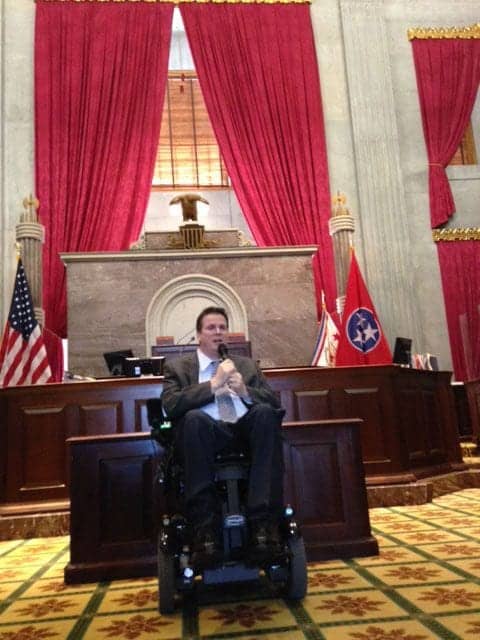by Ann Eubank, LMSW, OTR/L, ATP, CAPS
Our government, state and federal, sits on a hill—“The Hill,” as Washington, DC, insiders would say. We go to the Hill to advocate; politicians, lobbyists, and bureaucrats work on the Hill. The Hill sets the law of the land.
Accessing the Hill would seem to entail a steep climb, and with the constant daily barrage of media, drama, and “news,” the Hill appears that much further from our everyday lives.
Petitions of all sorts pop into our e-mail boxes, most seemingly good causes, asking us to sign, and to contact our elected officials. Does this really make a difference? Do our elected officials actually listen to us, or do they listen only to messages carried by the overpaid lobbyists who are sent by the mega industries?
I assume lobbyists have the advantage; they wouldn’t exist otherwise. Yet, as individuals, we do have access—direct access—if we have the gumption. You won’t hear “Stars and Stripes Forever” while reading this, because it’s not corny or a waste of time to develop a working knowledge of your local political system.
I recently participated in “Disability Days on the Hill” at Tennessee’s capitol in Nashville. Disability organizations from all over the state visited with representatives advocating for policies affecting the lives of people who are affected by disabilities. The community of people affected by disabilities does not often employ lobbyists. We are not an industry, but a community advocating for equal access to programs and services.
We might not carry the financial clout to influence elected officials, but we have community and mission. This year’s Hill Day included advocating for expansion of Medicaid.
Tennessee Disability Coalition provided information for us grass-rooters, bolstering our confidence to speak with our representatives. We met with our state representatives: elected officials who can help fix potholes in our streets or determine whether our state will expand Medicaid to 80,000 Tennesseans with disabilities, who are also younger than age 65 years, below 138% of the federal poverty level, and who do NOT receive Medicaid.
Carol Westlake, Executive Director of Tennessee Disability Coalition, articulates our advocacy position well with the following comment: “For too many individuals with disabilities, lack of access to healthcare is an insurmountable barrier to economic self-sufficiency and productivity. Getting a ‘hand up’ from an enabling government through Medicaid expansion means that individuals with disabilities who work, or who want to work, can earn more, save more, and still have needed coverage. Rather than forcing people to remain on social security benefits, in poverty and unemployed, we should invest in their futures, and ours, by providing health care coverage.”
We are very fortunate that our local officials are so accessible. Because of this, we can discuss a set of issues that ranges from minor annoyances such as fixing a pothole to truly substantial issues such as expanding Medicaid. Tennessee, like many states, governs with a part-time legislature. That means our representatives have day jobs and meet at Legislative Plaza part-time. These individuals are truly part of our communities.
These elected officials also realize every voter counts—especially a voter who takes the time to write, call, or visit.
As healthcare professionals, it is our duty to be empowered enough to engage with our representatives in government. We must point out critical information, such as the fact the state has reduced its funds to its most vulnerable population by more than 60% since 2009. Sixty percent!
Find out whether your state has expanded Medicaid.
Finally, to quote Tennessee state legislator Darren Jernigan (pictured above), the following are steps to becoming an advocate—which are key in understanding how to make your voice heard.
1. Register to vote, and vote.
2. Donate even $5 to a campaign. This will get you on the campaign’s list of donors.
3. Donate some time to the representative’s campaign: wear a T-shirt, make some calls, etc (easy stuff that means a lot).
4. Become involved in your community through such things as a neighborhood association. You then represent more votes than just your own.
5. If you don’t feel like your representatives are doing a good job, run for office yourself. Such an action will ensure those representatives will absolutely know who you are.
The political process on the Hill is not boring, it is not too much work; understanding and advocating for policies affecting the community of people with disabilities is part of our professional values and ethics. RM
For more information, contact [email protected].




